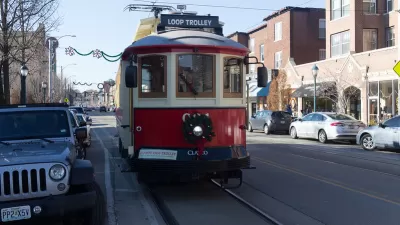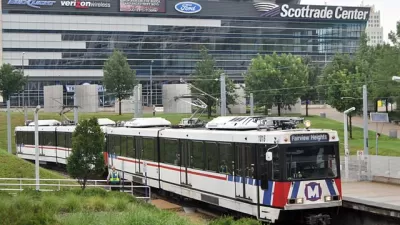The St. Louis Loop Trolley isn't running at full capacity, yet, but it's also falling well short of its projected ridership.

[Updated October 14, 2019) Mark Schlinkmann reports from St. Louis, where, "[a]fter more than a half-year in business, the Loop Trolley’s ridership and farebox revenue is lagging as the line continues to operate on a limited-hours schedule with just two of its three cars in service."
The trolley launched service on Nov. 16, 2018, and has been operating four days a week, instead of seven as planned in early budget documents that set ridership targets. Since opening, "11,364 tickets have been sold, producing farebox revenue of $22,283," reports Schlinkmann.
The trolley's third car is underway with testing, after a delayed delivery in January, which Loop Trolley officials hope will help increase the number of people who find reason to ride the streetcar.
FULL STORY: Loop Trolley ridership and fare revenue lag — it's raised just $22,283 in fares since Nov. 16

Planetizen Federal Action Tracker
A weekly monitor of how Trump’s orders and actions are impacting planners and planning in America.

Maui's Vacation Rental Debate Turns Ugly
Verbal attacks, misinformation campaigns and fistfights plague a high-stakes debate to convert thousands of vacation rentals into long-term housing.

Restaurant Patios Were a Pandemic Win — Why Were They so Hard to Keep?
Social distancing requirements and changes in travel patterns prompted cities to pilot new uses for street and sidewalk space. Then it got complicated.

In California Battle of Housing vs. Environment, Housing Just Won
A new state law significantly limits the power of CEQA, an environmental review law that served as a powerful tool for blocking new development.

Boulder Eliminates Parking Minimums Citywide
Officials estimate the cost of building a single underground parking space at up to $100,000.

Orange County, Florida Adopts Largest US “Sprawl Repair” Code
The ‘Orange Code’ seeks to rectify decades of sprawl-inducing, car-oriented development.
Urban Design for Planners 1: Software Tools
This six-course series explores essential urban design concepts using open source software and equips planners with the tools they need to participate fully in the urban design process.
Planning for Universal Design
Learn the tools for implementing Universal Design in planning regulations.
Heyer Gruel & Associates PA
JM Goldson LLC
Custer County Colorado
City of Camden Redevelopment Agency
City of Astoria
Transportation Research & Education Center (TREC) at Portland State University
Jefferson Parish Government
Camden Redevelopment Agency
City of Claremont




























